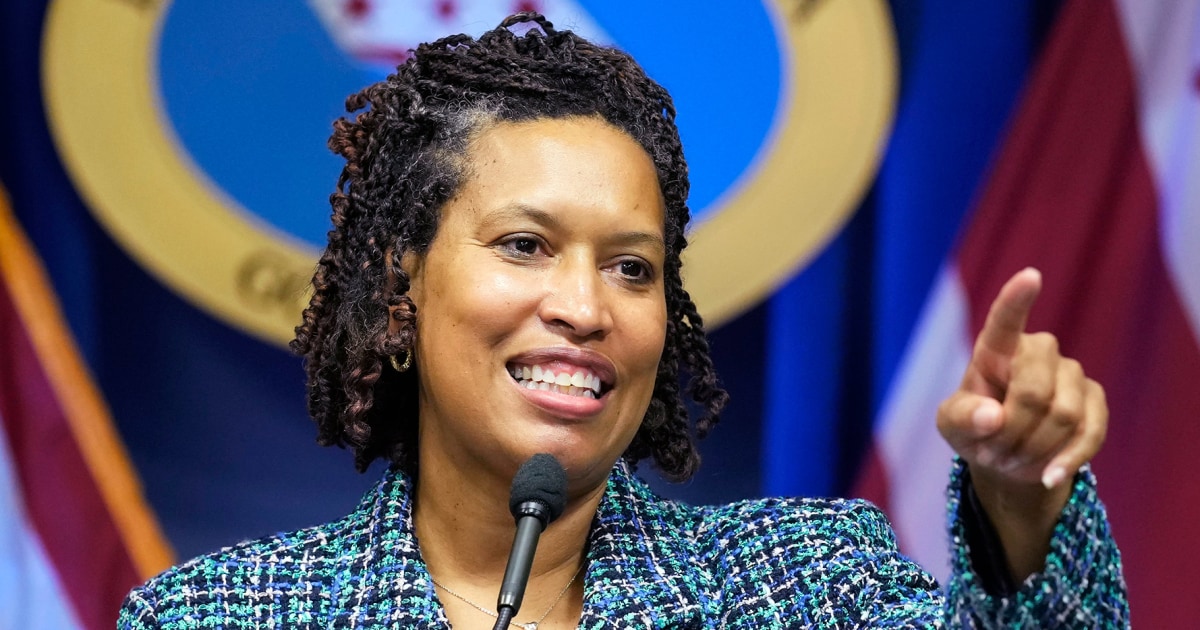
[ad_1]

In a move that ESPN’s Tony Korhneiser described as “villainy” and Mike Wilbon, his “Pardon the Interruption” co-host, described as “awful,” Virginia Gov. Glenn Youngkin announced Wednesday that the NBA’s Washington Wizards and the NHL’s Washington Capitals are planning to leave Washington, D.C., and set up shop in northern Virginia in 2028.
It’s only fitting that the latest quarrel between taxpayers and billionaires is taking place in our nation’s capital.
“This is the most visionary sports and entertainment development in the world, bringing together entertainment, sports, and technology in the most advanced innovation corridor in the United States: a once-in-a-generation and historic development for the Commonwealth, sports fans, and all Virginians,” Youngkin said in a statement.
As she vowed to keep fighting to keep the teams in town, D.C. Mayor Muriel Bowser said the district had offered to spend $500 million toward the effort, but that Ted Leonsis, who owns the teams, and his group wanted $600 million. Wilbon was correct when he argued on air that that difference was not enough for Leonsis to walk away from a deal. After all, Wilbon argued, fans had hardly seen a return for all the money they’d put into the two underperforming teams.
It’s only fitting that the latest quarrel between taxpayers and billionaires is taking place in our nation’s capital, because we’re generally united as a country in our insistence on wasting money on such boondoggles. For example, the day before Youngkin announced that the professional basketball team and professional hockey team would be moving to Virginia, voters in Oklahoma City approved a 1% sales tax to fund a $900 million arena to retain the NBA’s Thunder franchise through 2050. (That’s the team formerly known as the Seattle Supersonics that left that city after its then-owner failed to get taxpayers to pay for a $500 million arena there.)
The Thunder’s ownership group will spend $50 million on construction of the new entertainment complex that will cost almost $1 billion. Nick Singer, a local realtor and organizer of the opposition group “Buy Your Own Arena,” laid the numbers bare: “These guys have made almost $2.7 billion, and they’re going to tell us they can’t afford a $1 billion arena?”
It’s understandable that Leonsis would be excited about moving to Virginia and that the Thunder’s ownership group would be excited about new arenas. They’re not footing most of the bill. Taxpayers are. It’s also understandable why Kornheiser and Wilbon, two former Washington Post sports columnists, would be so upset. But being constantly held over the barrel by billionaires is something Americans as a whole should be upset about.
It should trouble us all that billionaires, who already receive a remarkable amount of tax breaks, get to pass the buck to taxpayers in cities where basic needs in terms of housing and transportation — anti-poverty initiatives — go unmet. It’s even more insulting when sports owners, who build in the inner city but don’t build up the inner city, later decide to make the move to “greener pastures.”
Kevin Blackistone, a sports journalist and professor, rightly expressed concern about how demographics play a role in the Washington sports teams’ potential move to Virginia. The optics of a team moving from a predominantly Black area to a predominantly white one will produce more problematic rhetoric about poverty and crime in urban Black communities.
It should trouble us all that billionaires, who already receive a remarkable amount of tax breaks, get to pass the buck to taxpayers in cities where basic needs go unmet.
The planned move out of D.C. and into Virginia is also reminiscent of 2017, when Atlanta’s MLB team moved from Fulton County to Cobb County, which is less Black and more white. For years, Atlanta’s baseball team had Black stars. Black residents in Atlanta could identify with, and a cap that doubled as a flag for the metro’s hip-hop culture. The move to Cobb County was a case of white flight, or as one Deadspin writer put it in 2017, showed a lack of diversity in terms of demographics, politics and access.
On top of that that, the team’s move, a local economics professor said for a 2022 news report, was costing Cobb County taxpayers $15 million a year.
As a Black man who’s a sports fan, the ironies are overwhelming. Because of restrictive and racist policies, oftentimes the only refuge we find is in entertainment. Even though owners claim their teams bring an economic impact, those gains are rarely seen by people who live near their downtown stadiums. Even so, when owners take their teams out of town, it often devastates community morale.
I am encouraged by folks such as Singer who object to the expectation that taxpayers have to keep billionaires happy. He’s not the only one. “It’s such a huge amount on the citizens, which doesn’t seem like a very responsible use of our money,” Natalie Lucero told the AP. “Plus, it’s a regressive tax that affects the poorest people. It just doesn’t feel good to me.”
It shouldn’t feel good to anybody.
Nor should it feel good to anybody that, according to The Oklahoman, voter turnout Tuesday in Oklahoma City was 15.6%. We can never win against sports teams owners if we decide to forfeit the game.
[ad_2]
Source link
